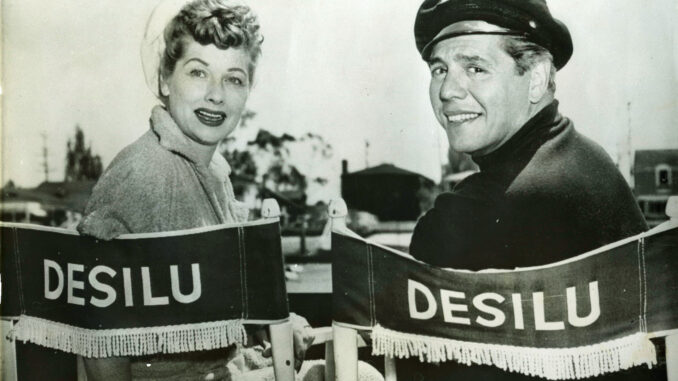
“Lucy and Desi” puts a big heart around Lucille Ball and Desi Arnaz, not only as the beloved stars of “I Love Lucy” and one of Hollywood’s great power couples, but as TV pioneers. Drawing upon personal recordings and home videos, director Amy Poehler has served up a warm valentine that leans into celebrating their lives and away from the tabloid fodder.
The documentary obviously serves as a sort of irresistible and logical companion to writer-director Aaron Sorkin’s recent Amazon movie “Being the Ricardos,” although in ways it’s even more nostalgic and sentimental. In terms of Arnaz’s serial infidelity, for example, it’s basically left to their daughter, Lucie Arnaz Luckinbill, to note that her parents hurt each other — him with his actions, and her with words.
What “Lucy and Desi” achieves most effectively is to capture the respective genius that the two brought not just to their show — which originated the multicamera sitcom format — but as producers more broadly. Detailing their respective backgrounds, it also presents their parallel rises to stardom before meeting on the RKO musical “Too Many Girls,” with Arnaz recalling seeing Ball and thinking, “Oh man, that’s a hunk of woman.”
Like many a show-business romance, their whirlwind courtship and marriage flamed brightly and fizzled, with each lasting much longer with their second spouses than they did with each other.
“To the rest of the world a Hollywood couple has no problems,” Ball says. “Of course, we do.”
Poehler does a terrific job of contextualizing (or ‘splainin,’ as Ricky might say) what made each special, with Carol Burnett describing Ball as “fearless in her comedy,” and others discussing Arnaz’s natural gifts as a producer that certainly weren’t obvious when he was making a living beating a conga in clubs.
“Lucy and Desi” doesn’t shy away from darker aspects exactly, or the troubles associated with the times. Arnaz reminisces about his excesses by citing regret about a lack of moderation, saying, “I either worked too hard or I played too hard.” Network executives, meanwhile, were nervous at first about how audiences would respond to seeing the Latin Arnaz as Lucy’s husband, and later (as covered in the recent movie) by Ball’s connection to the Red Scare.
Nevertheless, Poehler and writer Mark Monroe tend to accentuate the positive, incorporating truly stirring moments that even most fans of the show might not have seen or recall. There’s Ball’s Emmy acceptance speech for “The Lucy Show” in 1967 (11 years after her second win for “I Love Lucy”), her teary-eyed tribute at the Kennedy Center, and Arnaz Luckinbill recounting Lucy and Desi’s final conversation shortly before her dad’s death.
Ultimately, it’s an uplifting story of truly self-made talents who found each other, clawed their way to the top and helped birth something that, as the recent flurry of activity surrounding the show suggests, has survived them by decades.
Arnaz is said to have chafed at Ball’s fame at the time, but their mutual admiration comes through loud and clear. And while their marriage didn’t endure, watching the clips roll by merely underscores that “I Love Lucy” is forever.
